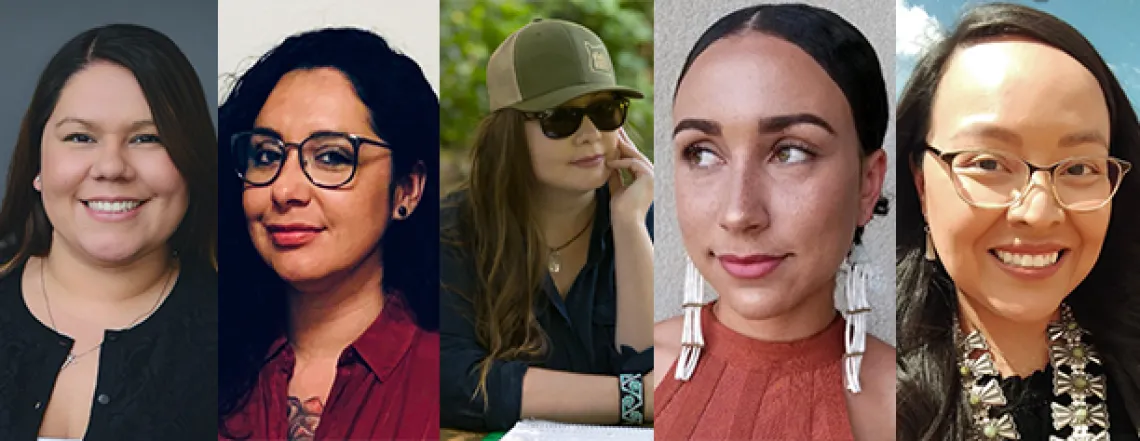Graduate Student Research and Travel Awards Spring 2020

The Native Nations Institute (NNI) is proud to announce the spring 2020 Graduate Student Research and Travel Awards. Six recipients are working on innovative research related to contemporary Indigenous issues that have practical policy implications and the potential to be useful to Indigenous leaders and decision-makers. The graduate students are using the NNI awards to present ongoing research at a national conference or collect data to strengthen their current research projects. We look forward to hearing more about their work. Please meet a few of the awardees below.
Tara Chico-Jarillo
Tara Chico-Jarillo, a member of the Tohono O'odham Nation, is from Tucson, Arizona. She holds a BS in Family Studies and Human Development and Master of Public Health in Maternal and Child Health from the University of Arizona. Currently, Tara is a Doctor of Public Health candidate in Maternal and Child Health at the University of Arizona. Tara has over 10 years of experience working with American Indian communities throughout Arizona. Prior to her graduate studies, Tara worked for a tribal child protective service agency to reunite families. Her previous public health experience includes program evaluation and community based participatory research in tribal communities with a focus on early childhood experiences and education, emergency preparedness and cancer. Her dissertation project focuses the prevention of alcohol exposed pregnancies and fetal alcohol spectrum disorders with on emphasis on understanding the process of adapting a prevention program for the urban Indian community.
Brittany Hunt
Brittany Hunt is a member of the Lumbee Tribe of North Carolina. She is a graduate of both Duke University and the University of North Carolina at Chapel Hill. She is currently an adjunct lecturer and PhD candidate at the University of North Carolina at Charlotte. She is the founder of the American Indian Urban Education Division at UNCC as well as the owner of Super Indian Apparel, an Indigenous clothing brand. In her spare time, she enjoys reading and spending time with family. She is also the author of "Whoz Ya People?," a children's book about a Lumbee boy nervous about his first day of school who soon learns that he has a whole community and 'people' to support him.
Lara Jacobs
Lara Jacobs is a citizen of the Muscogee Creek Nation of Oklahoma. She graduated Magna Cum Laude from Oregon State University with a Bachelor of Science Degree in Women Studies. Lara then earned a Master’s Degree in Environmental Studies from Prescott College and a Certificate from the University of Toronto in GIS, Mapping, and Spatial Analysis. Lara currently attends Oregon State University, where she’s working on a Ph.D. in Forest Ecosystems and Society and focuses her research in the field of Recreation Ecology, under the guidance of Dr. Ashley D’Antonio. Her dissertation research is a collaborative project with the Quileute Tribe in La Push, Washington. This research explores how outdoor recreationists impact bioecological factors inherent to marine environments, including the benthic species (such as shellfish) that the Quileute people use for subsistence. This research adds a much-needed cultural lens to the field of Recreation Ecology, but most importantly, it brings into focus the food sovereignty and fishing rights of an Indigenous group of people. Lara enjoys teaching college courses and mentoring students. After completing her Ph.D., Lara aspires to continue teaching at the University-level where she can help advance and support the educational and professional objectives of Native students and others who care about Indigenous land rights and recreation ecology.
Allison Ramirez
Allison Ramirez is a citizen of the Tohono O’odham Nation and a member of the Wa:k community (San Xavier Indian Reservation) in Southern Arizona. She is completing her PhD in Sociology at the University of California, Los Angeles. Her dissertation, Economies for/of/with “Us”: The Intersection of Water and Tohono O’odham Labor, examines how the accumulation of water has created and altered the Tohono O’odham labor force in times of extreme environmental change. To comparatively understand this relationship, from the perceptive of past and present Tohono O’odham laborers, she relies on archival materials and participant observations covering cotton production at the turn of the twentieth century in Central and Southern Arizona, Southern Arizona’s megadrought of 1941–1964, the construction of the Painted Rock Dam, and the present intersection of water and Tohono O’odham labor. Committed to Tohono O’odham Nation building, her research contributes to our understanding of how Indigenous communities negotiate their participation in an economy that is often extractive and invasive in the 21st century and beyond.
Richelle Thomas
Yá'át'ééh (Hello). My name is Richelle Thomas and I am Diné/Navajo. As is customary in Diné we share our clans to develop kinship amongst our relatives and with everything amongst us. My clans were given to me in the proceeding order and they are Ta’neeszahnii nishłí (tangle clan), Naasht’ézhí Tábąąhá báshíshchíín (zuni edgewater), Tó’aheedlííníí Naakai dine'e dashicheii (the people of the waters flow together clan), Kiyaa’áanii dashinalí (towering house clan). My maternal family is from Coalmine Mesa, Arizona and my paternal family is from Indian Wells, Arizona. I received my B.S. in Biology with a minor in chemistry and my M.S. in Environmental Sciences and Policy degrees from Northern Arizona University (NAU). I am currently attending the University of Arizona, where I am a PhD student in the Environmental Science department. My PhD project objectives are to quantify and examine uranium/heavy metal interactions in medicinal plants utilized by Native American tribes with a focus on the Diné people. The project focuses on the public health and safety aspect to the Diné people, while integrating biological and analytical techniques, traditional ecological knowledge, and policy. I hope that the project will bring about a positive change on the Navajo Nation regarding heavy metal regulation, to ensure the safety of not only the people but the medicinal plants that are utilized.

